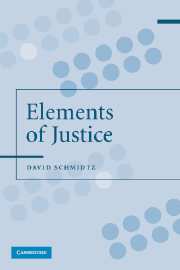Book contents
- Frontmatter
- Contents
- Acknowledgments
- PART 1 WHAT IS JUSTICE?
- PART 2 HOW TO DESERVE
- PART 3 HOW TO RECIPROCATE
- PART 4 EQUAL RESPECT AND EQUAL SHARES
- 18 Equality
- 19 Does Equal Treatment Imply Equal Shares?
- 20 What Is Equality for?
- 21 Equal Pay for Equal Work
- 22 Equality and Opportunity
- 23 On the Utility of Equal Shares
- 24 The Limits of Equality
- PART 5 MEDITATIONS ON NEED
- PART 6 THE RIGHT TO DISTRIBUTE
- References
- Index
23 - On the Utility of Equal Shares
Published online by Cambridge University Press: 05 June 2012
- Frontmatter
- Contents
- Acknowledgments
- PART 1 WHAT IS JUSTICE?
- PART 2 HOW TO DESERVE
- PART 3 HOW TO RECIPROCATE
- PART 4 EQUAL RESPECT AND EQUAL SHARES
- 18 Equality
- 19 Does Equal Treatment Imply Equal Shares?
- 20 What Is Equality for?
- 21 Equal Pay for Equal Work
- 22 Equality and Opportunity
- 23 On the Utility of Equal Shares
- 24 The Limits of Equality
- PART 5 MEDITATIONS ON NEED
- PART 6 THE RIGHT TO DISTRIBUTE
- References
- Index
Summary
Thesis: Previous chapters discussed synergies between meritocracy, humanitarianism, and equal treatment. This chapter examines a well-known argument about a synergy between equal shares and utility, grounded in the idea of diminishing marginal utility. The argument does not work.
DIMINISHING MARGINAL UTILITY
Thomas Nagel believes that from an impersonal standpoint, if we were picking principles of just distribution from an impartial perspective, we would have to be in favor of radical egalitarianism. At the same time, Nagel realizes, principles of equality are not the only principles we might adopt if we were to consider matters impartially. In particular, utilitarianism embodies its own brand of impartiality, and not everyone would agree that the imperative to equalize matters more than imperatives to maximize utility or to meet basic needs.
Nagel, however, believes that resolving theoretical tensions between equality and utility is moot. Egalitarianism and utilitarianism diverge in theory. As a practical matter, though, they converge in virtue of the phenomenon of diminishing marginal utility (henceforth DMU). As R. M. Hare puts it, the DMU of wealth and consumption means that approaches toward equality tend to increase total utility. Edwin Baker argues that, if wealth has declining marginal utility, then “a partial redistribution of income would maximize the total of individual utilities.” Therefore, “at least a limited intervention to increase equality will always be justified under utilitarian principles.”
- Type
- Chapter
- Information
- The Elements of Justice , pp. 140 - 149Publisher: Cambridge University PressPrint publication year: 2006



